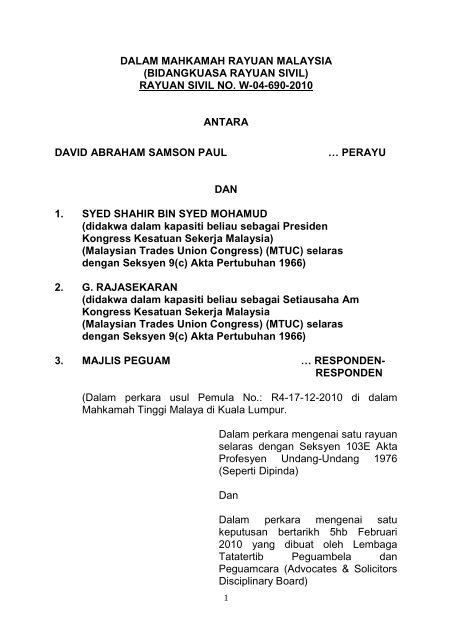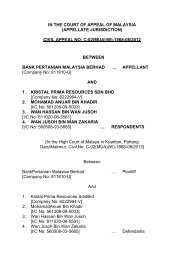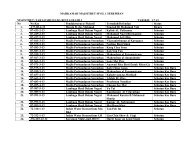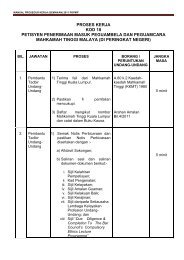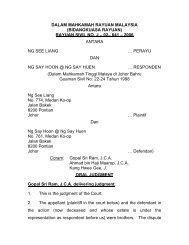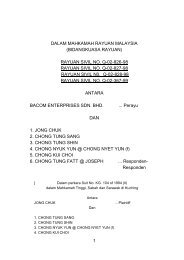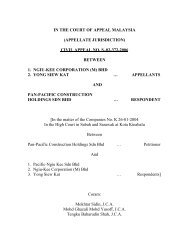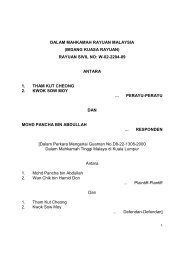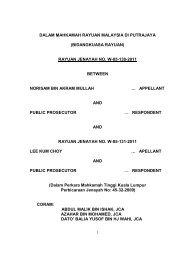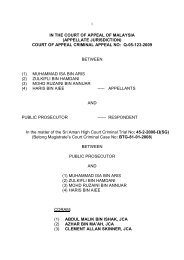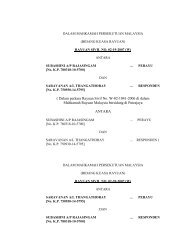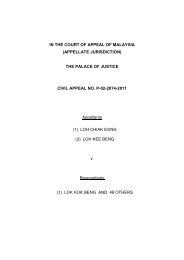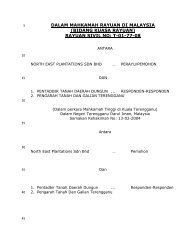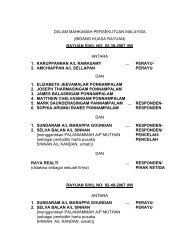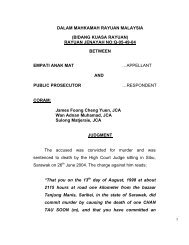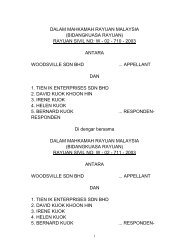rayuan sivil no. w-04-690-2010 antara david abraham samson paul
rayuan sivil no. w-04-690-2010 antara david abraham samson paul
rayuan sivil no. w-04-690-2010 antara david abraham samson paul
You also want an ePaper? Increase the reach of your titles
YUMPU automatically turns print PDFs into web optimized ePapers that Google loves.
DALAM MAHKAMAH RAYUAN MALAYSIA<br />
(BIDANGKUASA RAYUAN SIVIL)<br />
RAYUAN SIVIL NO. W-<strong>04</strong>-<strong>690</strong>-<strong>2010</strong><br />
ANTARA<br />
DAVID ABRAHAM SAMSON PAUL … PERAYU<br />
DAN<br />
1. SYED SHAHIR BIN SYED MOHAMUD<br />
(didakwa dalam kapasiti beliau sebagai Presiden<br />
Kongress Kesatuan Sekerja Malaysia)<br />
(Malaysian Trades Union Congress) (MTUC) selaras<br />
dengan Seksyen 9(c) Akta Pertubuhan 1966)<br />
2. G. RAJASEKARAN<br />
(didakwa dalam kapasiti beliau sebagai Setiausaha Am<br />
Kongress Kesatuan Sekerja Malaysia<br />
(Malaysian Trades Union Congress) (MTUC) selaras<br />
dengan Seksyen 9(c) Akta Pertubuhan 1966)<br />
3. MAJLIS PEGUAM … RESPONDEN-<br />
RESPONDEN<br />
(Dalam perkara usul Pemula No.: R4-17-12-<strong>2010</strong> di dalam<br />
Mahkamah Tinggi Malaya di Kuala Lumpur.<br />
Dalam perkara mengenai satu <strong>rayuan</strong><br />
selaras dengan Seksyen 103E Akta<br />
Profesyen Undang-Undang 1976<br />
(Seperti Dipinda)<br />
Dan<br />
Dalam perkara mengenai satu<br />
keputusan bertarikh 5hb Februari<br />
<strong>2010</strong> yang dibuat oleh Lembaga<br />
Tatatertib Peguambela dan<br />
Peguamcara (Advocates & Solicitors<br />
Disciplinary Board)<br />
1
Dan<br />
Dalam perkara mengenai satu aduan<br />
yang dibuat oleh Kongress Kesatuan<br />
Sekerja Malaysia (Malaysian Trades<br />
Union Congress) (“MTUC”) terhadap<br />
David Abraham Samson Paul di<br />
bawah Akta Profesyen Undang-<br />
Undang 1976 (Seperti Dipinda)<br />
Antara<br />
David Abraham Samson Paul … Perayu<br />
Dan<br />
1. Syed Shahir Bin Syed Mohamud<br />
(didakwa dalam kapasiti beliau sebagai Presiden<br />
Kongress Kesatuan Sekerja Malaysia)<br />
(Malaysia Trades Union Congress) (MTUC) selaras<br />
dengan Seksyen 9(c) Akta Pertubuhan 1966)<br />
2. G. Rajasekaran<br />
(didakwa dalam kapasiti beliau sebagai Setiausaha Am<br />
Kongress Kesatuan Sekerja Malaysia<br />
(Malaysian Trades Union Congress) (MTUC) selaras<br />
dengan Seksyen 9(c) Akta Pertubuhan 1966)<br />
3. Majlis Peguam … Responden-<br />
Responden<br />
CORAM:<br />
(1) RAUS SHARIF, PCA<br />
(2) RAMLY BIN HAJI ALI, JCA<br />
(3) SYED AHMAD HELMY BIN SYED AHMAD, JCA<br />
2
GROUNDS OF JUDGMENT<br />
The appellant, a practising advocate and solicitor was found guilty<br />
of professional misconduct consequent to a disciplinary enquiry<br />
conducted by the Disciplinary Committee (Committee) pursuant to<br />
Section 103B of the Legal Profession Act 1976 (LPA). In finding the<br />
appellant guilty for contravention of Section 94(3)(c)(k)(m)(n) and (o) of<br />
the LPA, the Committee recommended that the appellant be struck off<br />
the rolls of Advocates and Solicitor which finding and recommendation<br />
was endorsed by the Disciplinary Board (Board) constituted under<br />
Section 93 of the LPA who made an order accordingly on the 5.2.<strong>2010</strong><br />
(the Order). The Order of the Board was appealed against to the High<br />
Court but was dismissed on the 20.12.<strong>2010</strong>.<br />
Dissatisfied with the orders of the Board and the Court below the<br />
appellant pursued his appeal before us. After hearing the parties, we<br />
adjourned the matter for our consideration and decision. We <strong>no</strong>w give<br />
our decision and the reasons for the same.<br />
The subject matter of the disciplinary proceedings against the<br />
appellant was premised on a written complaint lodged by the Malaysian<br />
Trade Union Congress (MTUC) (the Complainant) made on 8.8.96<br />
against him for <strong>no</strong>t accounting for monies received by him in his capacity<br />
as their Solicitor and in particular to the failure to account for the sum of<br />
RM750,000.00.<br />
The sum of RM750,000.00 represents part of the proceeds of sale<br />
of the MTUC building (the Property) to Thrifty Realty Sdn Bhd for RM15<br />
millions pursuant to a Sale & Purchase agreement dated 1.6.93 (the<br />
3
SPA). The appellant by virtue of having been retained to act for MTUC’s<br />
other legal matters, acted for MTUC in the sale of the Property.<br />
The highlight of the sale transaction was the several provision in<br />
the SPA which obligated the appellant to hold the initial payment of<br />
RM380,000.00 as stakeholder and to place the said sum in a deposit<br />
account with a bank - see clauses 4.1 and 5.4 of the SPA. Clause 6.2.1<br />
provides that <strong>no</strong> sum is required to be retained by MTUC in the event <strong>no</strong><br />
real property gains tax (RPGT) is payable. The sale transaction having<br />
been completed the balance of the purchase price of RM7,763,934.90<br />
was released to MTUC on 8.8.95.<br />
Coming back to the sum of RM750,000.00 the appellant had by<br />
letter dated 18.11.94 to MTUC informed them that the sum was retained<br />
by him for RPGT and pending adjudication of RPGT he had placed:-<br />
(a) RM7.5 million in a Trust Account.<br />
(b) RM705,785.40 in client account for payment of RPGT,<br />
legal fees and expenses.<br />
(c) In the event RPGT was <strong>no</strong>t payable the said sum shall<br />
be paid to MTUC inclusive of all interest but less legal<br />
fees and expenses incurred in the said sale.<br />
Upon exemption of RPGT being granted MTUC by letters dated<br />
11.9.95,7.11.95, 25.1.96, 20.6.96 and 4.7.96 requested for the release<br />
of the said sum of RM750,000.00 and the accrued interest thereon but<br />
received <strong>no</strong> response except for a reply through letter dated 10.7.96 that<br />
the RPGT sum was only a “reserve figure” for accounting purposes.<br />
4
Being stonewalled and <strong>no</strong>t eliciting any response MTUC instructed<br />
Skrine & Co to demand for the release which was duly executed by<br />
Skrine & Co through their letter dated 15.7.96.<br />
The appellant responded to the letter by his reply of 25.7.96<br />
whereupon he claimed that the sum of RM750,000.00 was never<br />
retained for RPGT and was to be used in payment of the appellant’s<br />
interim fees, as the final account could <strong>no</strong>t be determined at the material<br />
time - hence that accounted for its entry for accounting purposes. The<br />
appellant also forwarded interim invoices for work done for the period<br />
1992 to 1996.<br />
In advancing his claim that the RPGT sum was offsetted by him for<br />
his interim fees he relied on an oral agreement with the then Secretary<br />
General of MTUC Dr. V. David as reflected in a letter dated 22.10.92<br />
written by him to MTUC and also a Statutory Declaration of Dr. V. David<br />
affirmed on 22.9.93.<br />
Since the appellant’s defence before the Disciplinary Committee<br />
rested heavily on the letter dated 22.10.92 and Dr. V. David’s Statutory<br />
Declaration of 22.9.93 the circumstances behind its evolvement<br />
necessitates reflection.<br />
A very pertinent point that comes to the fore in respect of the letter<br />
of 22.10.92 and the Statutory Declaration was that it was never<br />
produced during the inquiry before the Investigating Tribunal which had<br />
finalised its report on 31.5.02. <strong>no</strong>r was it mentioned in the several reply<br />
letters of the appellant to MTUC and/or its solicitors. The first time that<br />
the said letter surfaced was when it was produced before the<br />
5
Disciplinary Committee on 25.6.03 and <strong>no</strong> explanation as to why it could<br />
<strong>no</strong>t be produced earlier before the Investigating Tribunal was<br />
forthcoming. The circumstances aforesaid would invariably have a<br />
bearing on the weightage to be accorded to it.<br />
Against the background of the sequential events aforesaid and the<br />
contemporary documents adduced and after analysing the evidence<br />
proffered the Disciplinary Committee arrived at the following findings.<br />
(a) There are glaring contradictions between the<br />
appellant’s explanation and the several earlier letters<br />
written by him with regards to the RPGT sum.<br />
(b) There was utilisation of the sale proceeds towards<br />
deduction of his fees.<br />
(c) Failure on the part of the appellant to place the RPGT<br />
sums on fixed deposits.<br />
(d) The letter dated 22.10.92 written by the appellant to<br />
MTUC was <strong>no</strong>t a blanket authority <strong>no</strong>r an authorisation<br />
to the appellant to deduct his fees or interim fees as<br />
and when he liked.<br />
(e) The lump sum fees of RM281,000.00 and<br />
RM380,000.00 were grossly excessive in all the<br />
circumstances.<br />
6
(f) There was <strong>no</strong> evidence produced to show that the<br />
appellant had <strong>no</strong>tified MTUC that the monies held in<br />
his client’s account were withdrawn towards payment<br />
of costs and fees.<br />
The High Court at the hearing of the appellant’s application to set<br />
aside the Disciplinary Board order upheld the Board’s decision and<br />
concluded that the Disciplinary Board’s findings of misconduct was<br />
supported by the evidence and that the appellant breached the<br />
provisions of the SPA in the manner in which he retained and deducted<br />
the monies for his legal fees. In short there was concurrent findings by<br />
the High Court.<br />
Learned Counsel for the appellant in the appeal before us<br />
submitted that the nub of the issue for determination was whether the<br />
appellant was entitled to set off the three (3) bills of cost which he had<br />
rendered to the MTUC – if he was entitled to do so then the MTUC’s<br />
complaint and subsequent findings of misconduct on the part of the<br />
appellant can<strong>no</strong>t be sustained. It is the submission of learned Counsel<br />
that based on the evidence placed before the Committee and the Court<br />
below the Committee erred is <strong>no</strong>t finding that the appellant has the right<br />
of set off.<br />
In support of his submission on a solicitor’s right of set off Learned<br />
Counsel for the appellant adverted to the following evidence adduced<br />
before the Disciplinary Committee.<br />
(a) The letter dated 22.10.92 from the appellant to MTUC<br />
confirming an agreement that appellant’s fees and<br />
7
disbursements for all work done shall be deducted<br />
from the monies received from the sale of the MTUC<br />
building.<br />
(b) The statutory declaration of Dr. V. David dated 22.9.03<br />
which the appellant contends was overlooked by the<br />
Disciplinary Committee;<br />
(c) The three bill of costs dated 17.6.93, 1.8.94 and<br />
25.9.94 which the appellant submits were delivered to<br />
and received by MTUC.<br />
(d) Rule 7(a)(v) Solicitors Account Rules 1990 which<br />
provides for the right of set off.<br />
In advancing his argument learned Counsel stressed that the<br />
erroneous appreciation of evidence by both the Disciplinary Committee<br />
and the Court below has resulted in evidence favourable to the appellant<br />
<strong>no</strong>t being taken into consideration. The misappreciation of evidence<br />
relates to the Committee’s findings that there was <strong>no</strong> evidence produced<br />
to show that the appellant had <strong>no</strong>tified MTUC that the monies held were<br />
withdrawn and applied in satisfaction of the costs of fees as contained in<br />
the interim bills which finding was occassioned by the oversight of the<br />
Committee in overlooking the terms of the letter of 22.10.92 and the<br />
evidence of Dr. V. David. Had this aspect of the evidence which is<br />
favourable to the appellant been considered by the Committee and by<br />
extension the Court below would <strong>no</strong>t have fallen into error.<br />
8
The appellant’s submission of the Committee’s failure to consider<br />
evidence favourable to the appellant was premised on the material<br />
discrepancies appearing in the Notes of Proceedings forwarded to the<br />
parties from time to time upon the conclusion of each hearing and that<br />
as contained in the Bundle of Documents forwarded to the appellant by<br />
the Board pertaining to the record of the evidence of Dr. V. David at his<br />
residence on 10.10.03. The omission according to learned Counsel for<br />
the appellant has severely prejudiced the appellant.<br />
The material discrepancies in the <strong>no</strong>tes of proceedings was<br />
addressed by the learned High Court Judge who concluded that by<br />
reason of the appellant’s failure to furnish particulars of the<br />
discrepancies and its consequential effect on the Disciplinary<br />
Committee’s findings the challenge can<strong>no</strong>t be sustained. The learned<br />
Judge in rejecting the challenge though ack<strong>no</strong>wledging that the <strong>no</strong>tes of<br />
proceedings of 10.10.03 on Dr. V. David’s evidence given at his<br />
residence was <strong>no</strong>t referred to by the Disciplinary Committee in its report<br />
nevertheless concluded the failure as such had <strong>no</strong> bearing on the<br />
Disciplinary Committee’s findings. The Court reasoned that the<br />
Disciplinary Committee had taken into consideration the effect of the<br />
appellant’s letter of 22.10.92 and hence <strong>no</strong> prejudice can be said to be<br />
occasioned - see page 29 of the Appeal Record. As stated in the earlier<br />
part of our judgment the evolvement and timing of the surfacing of the<br />
letter of 22.10.92 was fraught with suspicion occasioned by the absence<br />
of its mention in the replies to the several written complaints and<br />
demands of MTUC and to the Investigating Tribunal. It is laced with an<br />
element to deceive and his conduct unbefitting of an advocate and<br />
solicitor falling within the scope of Section 94(3) of the Legal Profession<br />
Act 1976.<br />
9
In our view the consideration of the letter aforesaid evidences the<br />
Disciplinary Committee’s acceptance that the letter correctly records the<br />
subject matter of the teleconversation namely the evidence of Dr. V.<br />
David given at his house on 10.10.03 and in the statutory declaration<br />
dated 22.9.03. Hence <strong>no</strong> prejudice is caused to the appellant. The<br />
point to <strong>no</strong>te is the unmistakeable explicit finding of the Disciplinary<br />
Committee that the letter did <strong>no</strong>t give the appellant blanket authority to<br />
deduct his fees or interim fees as and when he liked.<br />
Further the Disciplinary Committee’s and High Court’s conclusion<br />
that the evidence of Dr. V. David has <strong>no</strong> bearing on its decision<br />
emanated from the Disciplinary Committee’s visit to Dr. V. David where<br />
from the evidence recorded by Disciplinary Committee it can be inferred<br />
his incoherent and unreliable behaviour.<br />
Adverting to the appellant’s reliance on Rule 7(a)(v) of the<br />
Solicitor’s Account Rules 1994 to justify his entitlement to “set-off”<br />
regretfully it can<strong>no</strong>t be countenanced as the successful invocation of the<br />
Rule requires the fulfilment of the prerequisites therein.<br />
follows:-<br />
Rule 7(a)(v) of the Solicitor’s Account Rules 1994 provides as<br />
“7. Drawing of money from client account<br />
There may be drawn from client account<br />
(a) in the case of client’s money -<br />
(v) money properly required for or towards payment of the<br />
solicitor’s costs where a bill of costs or other written<br />
intimation of the amount of the costs incurred has been<br />
delivered to the client and the client has been <strong>no</strong>tified<br />
10
that money held by him will be applied towards or in<br />
satisfaction of such costs.”<br />
From a plain reading of the section two requirements must be<br />
satisfied, namely proof of delivery of the bill and the RPGT monies held<br />
will be applied towards such costs. The evidence adduced falls short of<br />
the fulfilment of the two pre-requisites above. The Disciplinary<br />
Committee and the Court found that the appellant had off setted his legal<br />
fees from the RPGT sum without delivering his bill of costs and <strong>no</strong>tifying<br />
MTUC of his intention to do so.<br />
The appellant’s Counsel in the course of his submission sought to<br />
capitalise on the Learned High Court Judge’s decision overruling the<br />
findings of the Disciplinary Committee on the excessiveness of the three<br />
bills and its consequential unfairness and prejudicial effect to the<br />
appellant as misconduct under Section 94(m) of the Legal Profession<br />
Act. Though the learned High Court Judge ruled as erroneous the<br />
Committee’s findings of the excessiveness of the three bills and its<br />
prejudicial effect nevertheless in our view the ruling aforesaid of the High<br />
Court Judge does <strong>no</strong>t negate the whole Order as it is only limited to one<br />
category of misconduct namely that of sub paragraph (m) of Section<br />
94(3) LPA. The other acts of misconduct found by the Committee under<br />
Section 94(3)(c)(k)(n) and (o) LPA remained intact and was affirmed by<br />
the Learned Judge as appears in her grounds of judgment at page 32 -<br />
33 of the Appeal Record where she stated:-<br />
“The cumulative effect of the appellant’s wrongful conduct in retaining<br />
and deducting his client’s money, a case of misconduct under Section<br />
94(3)(c)(k)(n) and (o) of the Legal Profession Act 1976 has been<br />
made out. There is <strong>no</strong> misdirection committed by the DC as alleged<br />
11
y the appellant that warrant interference by this Court.”<br />
We have scrutinised the Appeal Record in depth and given serious<br />
consideration to the submissions both oral and written made by the<br />
parties and it is our unanimous view that both the Disciplinary<br />
Committee and the Court below did <strong>no</strong>t err in the conduct of the hearing<br />
and its application of the relevant legal principles. The findings of the<br />
Disciplinary Committee which was affirmed by the High Court was in<br />
accord with the evidence adduced and the sentence passed does <strong>no</strong>t<br />
warrant any appellate interference.<br />
The appellant it should be recalled was found guilty of misconduct<br />
under four sub-paragraphs of Section 94(3)LPA, namely:-<br />
(c) dishonest or fraudulent conduct in the discharge of his<br />
duties;<br />
(k) breach of any provision of the Act or of any rules<br />
thereunder or any direction or ruling of the Bar Council;<br />
(n) gross disregard of his client’s interests; and<br />
(o) being guilty of any conduct which is unbefitting of an<br />
advocate and solicitor or which brings or is calculated<br />
to bring the legal progression into disrepute.<br />
The definition of misconduct is laid down in Section 94(3) LPA. It<br />
means conduct or omission to act in Malaysia or elsewhere by an<br />
advocate and solicitor in a professional capacity or otherwise which<br />
12
amounts to grave impropriety and includes the 15 instances as detailed<br />
therein. The definition aforesaid is <strong>no</strong>t exhaustive and being widely<br />
worded would clearly encompass both dishonest conduct in the<br />
discharge of professional duty and fraudulent conduct or conduct<br />
otherwise unbefitting a solicitor and the conduct of the appellant herein<br />
falls within the scope.<br />
We shall <strong>no</strong>w address the issue of the appropriate penalty.<br />
Learned Counsel for the appellant in his address on the penalty imposed<br />
urged us that the circumstances of the case does <strong>no</strong>t warrant the<br />
extreme punishment of being struck off the Rolls to be imposed.<br />
The appropriateness penalty issue would invariably involve<br />
consideration of <strong>no</strong>t only the interests of the appellant but also the wider<br />
interests of the public and the profession. The legal profession is a<br />
ho<strong>no</strong>urable one which holds a very commanding and respectable<br />
standing in society as it is one of the vehicles for the pursuit of justice.<br />
Hence honesty and integrity is a cardinal characteristic of this <strong>no</strong>ble<br />
profession which plays an indispensable part in the administration of<br />
justice.<br />
In deciding the appropriateness of the penalty it is instructive to<br />
appraise ourselves of the guidelines laid down by the following two<br />
cases.<br />
In Bolton v Law Society [1994] 2 All E.R. 486 Sir Thomas<br />
Bingham M.R. at page 491 said:-<br />
13
Any solicitor who is shown to have discharged his professional<br />
duties with anything less than complete integrity, probity and<br />
trustworthiness must expect severe sanctions to be imposed<br />
upon him by the Solicitors Disciplinary Tribunal. Lapses from the<br />
required high standard may, of course, take different forms and be of<br />
varying degrees. The most serious involves proven dishonesty,<br />
whether or <strong>no</strong>t leading to criminal proceedings and criminal penalties.<br />
In such cases the tribunal has almost invariably, <strong>no</strong> matter how<br />
strong the mitigation advanced for the solicitor, ordered that he<br />
be struck off the Roll of Solicitors. Only infrequently, particularly in<br />
recent years, has it been willing to order the restoration to the Roll of a<br />
solicitor against whom serious dishonesty had been established, even<br />
after a passage of years, and even where the solicitor had made every<br />
effort to re-establish himself and redeem his reputation. If a solicitor<br />
is <strong>no</strong>t shown to have acted dishonestly, but is shown to have<br />
fallen below the required standards of integrity, probity and<br />
trustworthiness, his lapse is less serious but it remains very<br />
serious indeed in a member of a profession whose reputation<br />
depends upon trust. A striking-off order will <strong>no</strong>t necessarily<br />
follow in such a case, but it may well.<br />
In Re A Practitioner [1984] 36 SASR 591 which was a case of<br />
criminal misappropriation of monies by a solicitor, King C.J. at page 593<br />
stated:-<br />
I can<strong>no</strong>t regard suspension as an adequate response to the type of<br />
unprofessional conduct in which this practitioner engaged. The proper<br />
use of suspension is, in my opinion, for those cases in which a<br />
legal practitioner has fallen below the high standards to be<br />
expected of such a practitioner, but <strong>no</strong>t in such a way as to<br />
indicate that he lacks the qualities of character and<br />
trustworthiness which are the necessary attributes of a person<br />
entrusted with the responsibilities of a legal practitioner.<br />
14
The principles on disciplinary sentencing as distilled from the<br />
authorities aforesaid are two fold:-<br />
(1) where a solicitor has acted dishonestly, the appropriate<br />
order is struck off the roll of solicitors.<br />
(2) if a solicitor is <strong>no</strong>t shown to have acted dishonestly, but<br />
is shown to have fallen below the required standards of<br />
integrity, probity and trustworthiness he will<br />
<strong>no</strong>netheless be struck off the roll, as opposed to<br />
merely being suspended, if his lapse is such as to<br />
indicate that he lacks the qualities of character and<br />
trustworthiness which are the necessary attributes of a<br />
person entrusted with the responsibilities of a legal<br />
practitioner.<br />
The absence of any finding of dishonesty does <strong>no</strong>t per se make<br />
the sentence of being struck off the rolls excessive for the Court has in<br />
the absence of dishonesty struck off the roll an advocate and solicitor<br />
who had fallen below the standards of integrity, probity and<br />
trustworthiness - see Law Society of Singapore v Ravindra Samuel<br />
[1999] 1 SLR 696.<br />
Applying the principles aforesaid to the facts of this case as we<br />
have related in the earlier part of the judgment herein that there is an<br />
element of deceit and dishonesty being present which in our view<br />
justified the conclusion of the findings of both the Committee and the<br />
High Court of transgression of sub-paragraph (c) of Section 94(3) of the<br />
15
LPA - the misconduct is of such a nature that it warrants a penalty which<br />
have <strong>no</strong>t only a punitive affect but a deterrent one. The appellant who<br />
had a long standing relationship with MTUC should be forthright and<br />
transparent in his dealings and discharge his duties promptly,<br />
conscientiously, and diligently instead of misconducting himself in the<br />
manner he did.<br />
We do <strong>no</strong>t see any justification for us to interfere in the penalty<br />
meted out which in our view is appropriate and just in the circumstances<br />
of the case. The appeal is accordingly dismissed with costs. As the 3 rd<br />
respondent is <strong>no</strong>t claiming any costs <strong>no</strong> order as to costs is made in<br />
favour of the 3 rd respondent. The 1 st and 2 nd respondent is awarded<br />
costs in the sum of RM1,000.00. Deposit to the 1 st and 2 nd respondent<br />
to account of fixed costs.<br />
DATUK SYED AHMAD HELMY BIN SYED AHMAD<br />
Judge<br />
Court of Appeal<br />
Malaysia<br />
Dated this: 16th day of March 2012<br />
16
Counsel For The Appellant<br />
Tetuan Sreenevasan Young<br />
Peguambela & Peguamcara<br />
J-3A-13 Solaris Mont Kiara<br />
No. 2, Jalan Solaris<br />
5<strong>04</strong>80 Kuala Lumpur<br />
Counsel For The 1 st and 2 nd Respondent<br />
Tetuan P.Kuppusamy & Co.<br />
Peguambela dan Peguamcara<br />
No. 75-B, Jalan 1/12<br />
46000 Petaling Jaya<br />
Counsel for The 3 rd Respondent<br />
Tetuan JT Chong Associates<br />
Peguambela dan Peguamcara<br />
No. 21-2, 1 st Floor, Jalan 1/116B<br />
Kuchai Entrepreneours Park<br />
Off Jalan Kuchai Lama<br />
58200 Kuala Lumpur.<br />
Reference:<br />
1. Bolton v Law Society [1994] 2 All E.R. 486 Sir Thomas Bingham<br />
M.R.<br />
2. Re A Practitioner [1984] 36 SASR 591<br />
3. Law Society of Singapore v Ravindra Samuel [1999] 1 SLR 696.<br />
17


